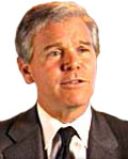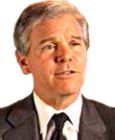Are there no heroes? Can you count on anyone these days without the distinct possibility that they will let you down in the future? The twin revelations this past week of John Edwards' acknoweldgement of his affair and the frontpage New York times story on child sexual abuse charges against America's Preemminent pediatrician, Melvin Levine, devastated me.
First, let's do Edwards. John Edwards along with Elliott Spitzer (what is it with these anti-corporate watchdogs?) were my two heroes when it came to policing the totalitarian power (as in Huxley's Brave New World) of the corporations. In my thirty years of practice as a behavioral pediatrician deciding who gets Ritalin -- for about a dozen years I've come to believe that Fortune 500 drug companies are the single biggest influence in our culture with regards to which child is or isn't mentally ill. The whole field of mental health/illness and treatment gets so tilted when corporate profits are so initimately involved in the process.
Therefore, I was so disappointed that registered Democrats did not more fully respond to Edward's campaign messages which in my mind were the clearest articulations of another way of thinking about America's business "not as usual." I had no problem voting for an ex-trial lawyer as a doctor (remember doctors are supposed to hate trial lawyers because of malpractice suits). I believe, in a society where money speaks the loudest and everybody must make a buck somehow, trial lawyers are the single group able to make money by policing corporations. It's a lousy system because victims must turn over up to half of their compensation to trial lawyers. But on the other hand the cost of doing battle with corporations is enormous because since the late 1880's they have been treated with the same rights as an individual, but one who can live forever and has potentially unlimited resources. I have grown to respect the trial lawyers who mortgaged their own homes to continue a fight against the manufacturers of SSRIs which ultimately led the warranted FDA "black box" warning.
So anyway, I cast an absentee ballot for Edwards in the California primary only to have a worthless vote when he pulled out three weeks before election day. I was bitter. Now I'm relieved and bitter in another way over another guy (this seems very much to be a guy thing, even with women in increasing power) getting narcissistic and hurbristic (his own words) and not being able to keep his penis in his pants. I'm relieved because he is not the Democratic candidate but bitter that another anti-corporate hero of mine has bitten the dust.
Then there is Mel Levine. I know Mel personally (not well) for almost thirty years. There were not many mentors in my field of behavioral-developmental pediatrics when I did my fellowship (there were only three fellowships then, now there are over fifty) in the mid-1970s. I really liked Mel's stuff. He was sensible. His notions that children learned differently and were not necessarily retarded if they couldn't read, seems mainstream now but in the early 1970s it wasn't. He wasn't as family systems oriented as my group at UCSF was, but again there weren't many confreres at the time and compared to the psychoanalysts still dominating my arena Mel was sensible (that word again).
Mel went on to co-edit the definitive textbook of behavioral-developmental pediatrics. He established his own fiefdom at University of North Carolina School of Medicine. He wrote a series of popular books, including the best-selling One Mind at a Time, that became the basis of a popular PBS documentary. He's always been sympathetic to my concerns about over diagnosis and the over and misuse of psychiatric drugs in children but was never willing to publicly support me in print. At times I was disappointed with him, especially over the bipolar issue in children -- not coming more publicly forward about his feelings -- because Mel was so powerful within the field of pediatrics and with the media and public in general. But I still respected him and hoped that he might change his mind in the future.
In the public realm of child sexual abuse claims unfortunately, it's the one arena where you're "guilty, until proven innocent." I don't know what to make of the charges of such a respected individual. I tend not to believe any of it but I am bothered by the one report (if confirmed) that he did physical examinations of prepubescent children without the presence of a parent or another professional. That strikes me as strange and I asked another colleague of mine if my memory was correct that when I was in the fellowship, we used to do physical exams, even on the kids with just major behavioral problems, just for the sense of true completeness (When I began my private practice in 1980 I decided not to do physicals and let the primary care doctor be responsible for that aspect). But even in the 1970s, whether in behavioral or general pediatrics, kids under 13 generally had a parent in the room. My memory is that for boys older than 13, when it came time to examining the genitalia (as part of any general physical exam), the mom (usually the parent present) was briefly sent out of the room (I mean for 30 seconds to a minute). I rarely did full gynecological exams on teenage girls, in which case a female nurse would always be present. So I don't get this private physical examination routine but I still know how troubled children and families can misinterpret even the most benign actions (remember McMaster!).
Since I'm naming names, another doctor, facing trial for child sexual abuse charges in January 2009, is William Ayres, the noted child psychiatrist, ex-president of the American Academy of Childand Adolescent Psychiatry. I do not know Dr. Ayres, personally (his practice was in the Bay Area like mine) but he too is charged with sexual abuse during physical examinations. He settled with one family out of court but then other families came forward (many had exceeded the statute of limitations). The local district attorney feels there is enough evidence to proceed with a trial.
So on it goes. I am not prepared to cast stones because you never know when something horrible like this could happen to you (either as victim or professional). My nineteen year old son says "But what about Barack?" Maybe because he is African-American and Hillary is a woman, the two of them have had to transcend an even higher degree of vetting and purity (Hillary had to deal with the consequences of another philandering powerful man). But I'm too broken by these recent series of allegations and revelations to really trust that this won't happen to anyone I care about in public life.


